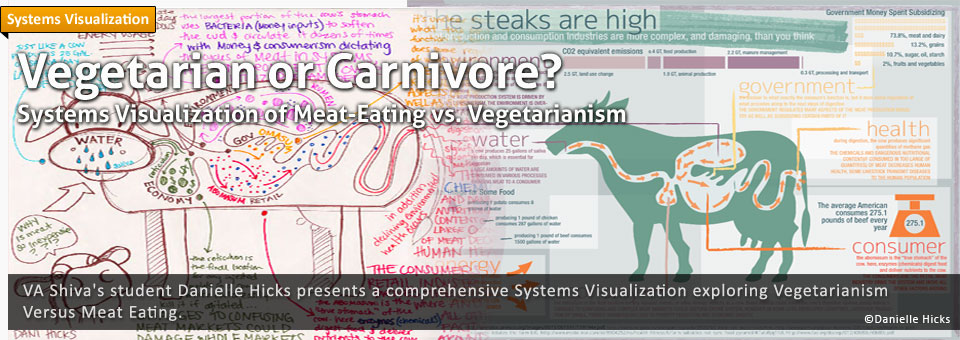
Systems Visualization of Meat-Eating vs. Vegetarianism
V A Shiva’s student Danielle Hicks presents a comprehensive Systems Visualization exploring Vegetarianism vs. Meat Eating
We present you with a short interview with Danielle Hicks
Q. Why did you take the Systems Visualization class?
A. I took SysViz because I’ve always been really interested in communication, specifically between people from different disciplines. As someone who considers themselves an artist as well as an engineer, I’d seen firsthand how important and challenging the expression of complex ideas is to everyone, not just people in technical disciplines. I respected the CMS department and thought this class would be a fun opportunity to learn more about my interests in communication.
Q. What was the system you were interested in visualizing?
A. I have a few friends who choose not to eat meat for health reasons, a few who don’t eat meat for religious reasons, and even a few for political reasons. The choice to not eat meat is becoming more and more publicized, but for incredibly diverse reasons. I was curious how, even if, they were all connected, and if one was more legitimate than any other. I thought it would be interesting to dig into some real data and to hear what experts said about this “system.”
Q. What was your metaphor and why did you select it?
A. The metaphor I used to represent the meat industry was, humorously enough, a cow’s digestive system. I was reading an article that was talking about how much water was required to produce feed that is given to cows and it reminded me of a fact that I’d heard once about how much saliva a cow produces in one day. From there, it was serendipitous that the rest of the cow’s digestive system was relevantly connected to the parts of the meat industry.

Q. What was the message you wanted to communicate to the viewer?
A. While doing research, I came across so many articles that were incredibly biased and emotional in how they talked about meat-eating. I knew I wanted to be extremely neutral and communicate a simple idea, without telling people what they should or shouldn’t do. My research revealed a lot, but the big idea was simple: The interconnections between parts of the meat industry are complicated, and that people should consider all of the factors involved before they make a decision about whether or not they’ll give up meat.
Q. How did your learn from doing the final project for the class?
A. The biggest take-away from the class for me, was the idea that you should look at a system or an idea you’re trying to communicate from as many different points as possible. it might not make sense as a pile of data, but it might make a really great picture, or it might not have a relevant metaphor, but it might be a really good game, or it might not be a good story, but it might make more sense when you graph it a certain way. You have to consider who your audience is, and how to best communicate your idea to them. It might not be what your instincts say. It was really easy to see this lesson during the final presentations, when we were able to see all of the variety in how people communicated their systems. Everyone’s projects were unbelievably different, so I learned a lot too!

Q. Are you a meat eater or vegetarian?
A. Haha! I love bacon too much to give up meat entirely, but since I’ve completed the project, I’ve generally tried to avoid most red meats, and choose other protein options that are available when possible. Except tofu, I can’t do tofu.
You May Also Be Interested In






